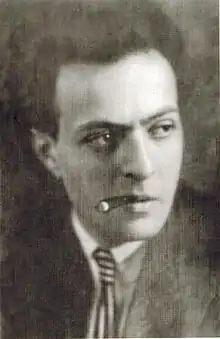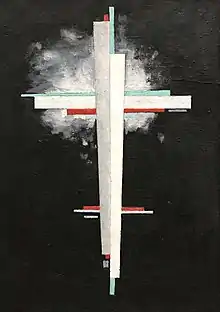Ilya Chashnik
Ilya Grigorevich Chashnik (1902, Lucyn, Russian Empire, currently Ludza, Latvia - 1929, Leningrad) was a suprematist artist, a pupil of Kazimir Malevich and a founding member of the UNOVIS school.[1][2]
Ilya Grigorevich Chashnik | |
|---|---|
 | |
| Born | June 26, 1902 |
| Died | March 4, 1929 Leningrad |
| Nationality | Russian |
| Education | UNOVIS school |
| Movement | suprematism |
Biography

Chashnik was born to a Jewish family in 1902, Lucyn, Russian Empire, currently Ludza, Latvia.
Chashnik was notably able in a variety of media. Aleksandra Semenovna Shatskikh describes him as "famous for his inexhaustible inventiveness and ability to apply Suprematist principles to virtually all forms of art, including easel painting."[3] He painted, was proficient in metalwork, and designed ceramics produced at the Imperial Porcelain Factory (then known as the Lomonosov Porcelain Factory).[3][4]
He died in 1929 in Leningrad, at the age of 27.
The University of Texas at Austin held an exhibition dedicated to his works in 1981.[5]
Works
 Suprematist composition
Suprematist composition Suprematist Composition, 1920, M.T. Abraham Foundation
Suprematist Composition, 1920, M.T. Abraham Foundation
References
- Илья Чашник - Живопись 20 века (in Russian). 20art.ru. Retrieved 24 June 2010.
- "Ilya Chashnik - Biography and works". Thyssen-Bornemisza Museum. Retrieved 2010-06-26.
With Suetin he planned the working class residential area of the Bolshevik factory in that city and he was closely linked to all the group of painters who made up the *Russian avant-gardes*; he was a founder member of the UNOVIS, whose initial programme contemplated the need to create new forms that would allow the construction of a new society.
- Aleksandra Semenovna Shatskikh (2007). Vitebsk: the life of art. Yale University Press. p. 143. ISBN 978-0-300-10108-9.
- Gordon Campbell (2006). The Grove encyclopedia of decorative arts, Volume 1. Oxford University Press. p. 306. ISBN 978-0-19-518948-3.
- Texas Monthly Apr 1981. Texas Monthly, published by Emmis Communications. 1981. p. 24.
External links
| Wikimedia Commons has media related to Ilya Chashnik. |
Literature
- Чашник Илья Григорьевич (1902-1929), ленинградский художник, ученик К. Малевича. Первая монография о мастере. (publ. 2002), ISBN 5-85164-077-4